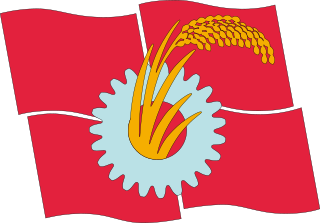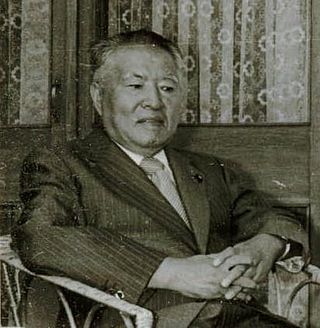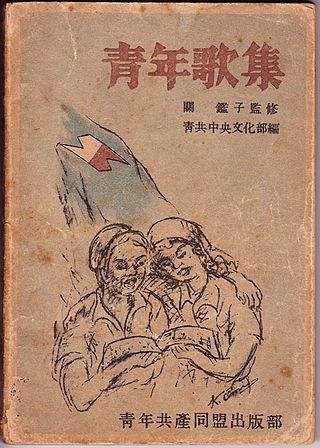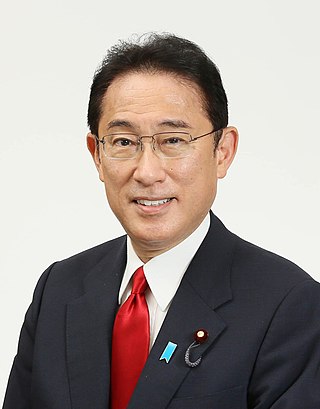
The politics of Japan are conducted in a framework of a dominant-party bicameral parliamentary representative democratic constitutional monarchy. A hereditary monarch, currently Emperor Naruhito, serves as head of state while the Prime Minister of Japan, currently Shigeru Ishiba since 2024, serves as the elected head of government.
Zengakuren is a league of university student associations founded in 1948 in Japan. The word Zengakuren (全学連) is an abridgement of Zen Nihon Gakusei Jichikai Sō Rengō (全日本学生自治会総連合) which literally means "All-Japan Federation of Student Self-Government Associations." Notable for organizing protests and marches, Zengakuren has been involved in Japan's anti-Red Purge movement, the anti-military base movement, the Anpo protests against the U.S.-Japan Security Treaty, the 1968–1969 Japanese university protests, and the struggle against the construction of Narita Airport.

Sanzō Nosaka was a Japanese writer, editor, labor organizer, communist agent, politician, and university professor and the founder of the Japanese Communist Party (JCP). He was the son of a wealthy Japanese merchant, and attended the prestigious Keio University. While in university, Nosaka became interested in social movements, and joined a moderate labor organization after graduation, working as a research staff member, and as a writer and editor of the organization's magazine. He traveled to Britain in 1919 to study political economy, where he deepened his studies of Marxism and became a confirmed communist. Nosaka was a founding member of the Communist Party of Great Britain, but his activity within British communist circles led to him being deported from Britain in 1921.

The Japanese Communist Party is a communist party in Japan. Founded in 1922, it is the oldest political party in the country. It has 250,000 members as of January 2024, making it one of the largest non-governing communist parties in the world. The party is chaired by Tomoko Tamura, who replaced longtime leader Kazuo Shii in January 2024.

Yamazoe is a village located in Yamabe District, Nara Prefecture, Japan. As of 31 August 2024, the village had an estimated population of 3,077 in 1307 households, and a population density of 46 persons per km2. The total area of the village is 66.52 km2 (25.68 sq mi).

The Japanese political process has two types of elections.

Japan Revolutionary Communist League, National Committee is a Japanese far-left revolutionary group, often referred to as Chūkaku-ha in Japanese. Their main goal is to have Japan, and the entire world, adopt communist policies. Chūkaku-ha rejects imperialism and Stalinism.

Kazuo Shii is a Japanese politician who has been the chairman of the Central Committee of the Japanese Communist Party (JCP) since 2024. He previously served as the chairman of the Executive Committee of the Central Committee of the JCP from 24 November 2000 to 18 January 2024.

Akira Koike is a Japanese politician and physician who is the secretary-general and vice chair of the Japanese Communist Party. He also serves as a member of the House of Councillors for the party.

Kenji Miyamoto was a Japanese communist politician. He was the leader of the Japanese Communist Party (JCP) from 1958 to 1977.

Taku Takaichi is a Japanese politician of the Liberal Democratic Party.

Taku Otsuka is a Japanese politician of the Liberal Democratic Party, a member of the House of Representatives in the National Diet. He is affiliated to the revisionist lobby Nippon Kaigi.
The New Left in Japan refers to a diverse array of 1960s Japanese leftist movements that, like their counterparts in the Western New Left, adopted a more radical political stance compared to the established "Old Left," which in the case of Japan was emblematized by the Japanese Communist Party and Japan Socialist Party. After emerging in the lead-up to the 1960 Anpo protests against the U.S.-Japan Security Treaty, the movement grew and diversified before climaxing with the Zenkyōtō movement which barricaded dozens of Japanese universities in 1968–1969. Much like its counterparts in the West, in the 1970s, the Japanese New Left became known for violent internal splits and terrorism, which caused the movement's influence to wane.

Masanosuke Watanabe was a member of the Japanese Communist Party. He was born in 1899 in Ichikawa, Chiba Prefecture. He was the son of a tatami mat maker. After graduating primary school in 1912, he went to Tokyo to work in a wine shop. In 1917, he worked in a celluloid factory in Kamedo section of Tokyo. He organized the National Celluloid Workers Union in Tokyo in 1919. He joined the Japanese Communist Party soon after its establishment in 1922. In March 1927, he went to Moscow to represent the JCP at the Comintern, and the eighth enlarged plenum of the ECCI. That same year, Watanabe returned to Japan and took over the leadership of the party. In March 1928, he was elected chairman of the JCP central committee. During Watanabe's lifetime, he married Tanno Setsu, a labour activist, and member of the Communist Party.

The Singing Voice of Japan is the name of a social and political movement that emerged after World War II in Japan and based on musical and choral activities of the working class of the entire nation. On the ideological position of communism or democratic socialism, activists of the movement organize choral circles in factories, in schools and in their residential areas. The movement reached its peak in the years 1950–60. Japanese singer Akiko Seki is generally regarded as the founder of the Singing Voice of Japan.

Yoshiko Kira is a Japanese politician and member of the House of Councillors since 2013, representing the Tokyo at-large district. She is a member of the Japanese Communist Party.

Kimie Hatano is a member of the Japanese Communist Party who served in both the House of Representatives and the House of Councillors. In the House of Representatives, she represented the 10th District of Kanagawa prefecture, while in the House of Councillors she represented the second seat of the Kanagawa at-large district. Hatano is opposed to the Technical Intern Training Program, saying that the workers in the program are being subordinated. She is also opposed to the Trans-Pacific Partnership. Hatano supports having more classes available in the evenings at junior high schools and is opposed to stopping state grants to national universities, saying that tuition would increase dramatically.

General elections were held in Japan on 31 October 2021, as required by the constitution. Voting took place in all constituencies in order to elect members to the House of Representatives, the lower house of the National Diet. As the constitution requires the cabinet to resign in the first Diet session after a general election, the elections will also lead to a new election for Prime Minister in the Diet, and the appointment of a new cabinet, although ministers may be re-appointed. The election was the first general election of the Reiwa era.
The Red Purge was an anticommunist movement in occupied Japan from the late 1940s to the early 1950s. Carried out by the Japanese government and private corporations with the aid and encouragement of the Supreme Commander for the Allied Powers (SCAP), the Red Purge saw tens of thousands of alleged members, supporters, or sympathizers of left-wing groups, especially those said to be affiliated with the Japanese Communist Party, removed from their jobs in government, the private sector, universities, and schools. The Red Purge emerged from rising Cold War tensions and the Red Scare after World War II, and was a significant element within a broader "Reverse Course" in Occupation policies. The Red Purge reached a peak following the outbreak of the Korean War in 1950, began to ease after General Douglas MacArthur was replaced as commander of the Occupation by General Matthew Ridgway in 1951, and came to a final conclusion with the end of the Occupation in 1952.
Akhtar Hussain is a Pakistani lawyer, senior advocate of Supreme Court of Pakistan and left wing political leader. He is president of the left-wing political party, Awami Workers Party. He served as the General Secretary of Awami Workers Party from 2016 to 2022. He stayed member of Pakistan Bar Council for ten years from 2010 to 2020 and elected as Vice Chairman in 2012. He was a member of the Judicial Commission of Pakistan for two years from 2019 to 2021.















